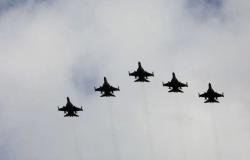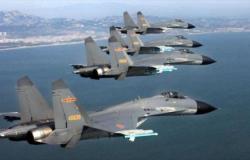Mike Studeman He is one of the people who best knows the movements and tensions of the Indo-Pacific. He knows in detail every movement the Chinese Communist Party (PCC) and what’s on his mind Xi Jinping. Between 2022 and 2023, this retired rear admiral assumed command of the Office of Naval Intelligence (ONI) and became director of the National Office of Maritime Intelligence-Integration. He was also a senior advisor to the Director of National Intelligence in his role as Director of National Maritime Intelligence.
Recently, Studeman He was director of intelligence in the US Indo-Pacific Command in Honolulu (2019-2022) and director of intelligence at the United States Southern Command in Miami between 2017 and 2019. Previously, he led the US Cyber Command Joint Intelligence Operations Center in Fort Meade and the Hopper Information Services Center in Suitlandboth in Maryland.
He currently works as an analyst and consultant in several organizations such as The National Bureau of Asian Research, MITER Corporation and WestExec Advisorsamong other. Studeman He is considered in the academic and military world as one of the most prominent professionals in national security, with extensive global experience in intelligence, foreign policy and defense.
His 35-year career began with the fall of the Berlin Wall and the Tiananmen Square massacre. He supported combat operations during the invasion of Saddam Hussein to Kuwait and participated in the Balkans, Iraq, Afghanistan, Yemen and Somaliaamong other global armed conflicts.
He is an expert on Asian affairs, with deep knowledge of China. Infobae We contacted him to find out what he thinks about the delicate situation in the Taiwan Strait and the Indo-Pacific. In the coming weeks your book will be published Might of the Chain. In addition, he is a frequent columnist for specialized sites, where he is consulted about the delicate geopolitical situation.
– In a recent article, you mentioned that Beijing has made internal preparations for possible economic isolation and resistance to possible international sanctions. Do you think that these measures, together with recent military investments, are sufficient signs of preparations for an imminent invasion?
– I don’t think an invasion is imminent, but it is certainly an increasingly likely course of action. In my opinion, Xi Jinping is very likely to commit the People’s Liberation Army (PLA) to more overt military action in the single-digit time frame, or less than 10 years from now. All indicators point to Xi Jinping preparing his country for war and has been doing so for years. China would, of course, prefer to win without fighting. They would love to find a pressure formula that forces Taipei to engage in political talks about assimilation under the CCP without firing a shot. Any major operation against Taiwan would be a supreme gamble that could go horribly wrong for Xi and the CCP. Xi knows this and is still not fully confident that the PLA can successfully carry out a major operation, especially if the United States intervenes. But the prospect of peaceful unification appears increasingly unlikely, especially after the CCP demonstrated the ruination of its “one country, two systems” promise to Hong Kong.
– China is going through difficult times and has very serious economic problems. Don’t you think that an invasion or a blockade could aggravate these problems despite the preparations you mentioned?
– China faces economic headwinds, most of which are of its own making. The CCP and Xi have clearly prioritized security over the economy and are paying the price for this choice. This marks a radical change from the era of Deng Xiaoping to Hu Jintao, leaders who promised Chinese citizens that they could get rich as long as they did not demand political freedoms. Xi is a red ideologue, who has once again insisted on the essentiality of the Party in all aspects of life. Xi also believes China must undergo short-term economic pain to correct major structural problems at home. The real estate market is a good example. In the long term, Xi believes China will regain its balance and continue to strengthen relative to the United States, the EU and other countries. This long-term vision is important. Xi would not make the decision now to blockade or invade Taiwan. He needs time to make sure that such an operation is a guaranteed victory. Recall his directive to the PLA to be ready by 2027. That does not mean China is committed to an ironclad countdown to instant strike on January 1, 2027. It means Xi wants a viable military option for final resolution by the end of the 2020s. 2020. It will decide what to do and when to do it based on a number of factors: geopolitical, internal, military, economic and various international conditions. Xi will decide when conditions are most favorable, his country is fully prepared and when all other options have been exhausted, in his view.
– In an invasion scenario, what role do you think the Indo-Pacific countries, such as Japan, Korea, the Philippines and Vietnam, would assume?
– I think it will depend on the political leaders in power at that time. We have seen big swings in Manila, for example, and some countries could very well decide to do nothing. Japan is a special case, given the US military presence there. Any Chinese attack on Japanese bases will force Tokyo to make a decision, not just to defend itself, but to do something more. Tokyo leaders are likely to debate this issue internally for years. Meanwhile, they are strengthening their army and preparing for worst-case scenarios. I do not expect Vietnam to participate in any way. Under a pro-US administration in Manila, the United States could operate from Philippine soil under certain specific conditions approved by Manila. Under a pro-China or China-fearing administration, Manila might do nothing. The Republic of Korea is increasingly concerned about the role it could play in major military action in the Western Pacific. A strengthened alliance system between the United States, Japan and the Republic of Korea suggests greater solidarity in anticipation of various contingencies.
– Could China’s lack of war experience lead to military humiliation?
– Yes. The PLA has not fought a war since 1979 and remains a deeply hierarchical organization that prevents the freedom of action of its subordinates. The PLA has impressive equipment and is highly lethal in all areas of warfare. He continues to improve his capabilities, is very active from an operational point of view and does many exercises and even shooting. It is a strong army in its own right. But you would be right to question the PLA’s ability to execute highly complex and dynamic operations against fierce resistance from some of the world’s best militaries, including the world’s most powerful. If the PLA fails in such an operation, Xi is likely to lose his mandate as head of the CCP, and could even lose his life. The PLA’s lack of experience could lead not only to military humiliation, but to Xi’s humiliation before his people and before the world.
– How long could Taiwan resist an attack and a blockade? Can you imagine a scenario similar to the conflict between Ukraine and Russia?
– Surveys show a higher proportion of Taiwanese (70-80% on average) willing to fight to defend the island from a Chinese invasion. Taiwan is moving towards greater civil-military cooperation to build a society-wide defense capability. Taiwan also understands that a people’s war against China may be necessary if the PLA manages to gain a physical foothold in Taiwan. The island is increasing its defense budget, expanding recruit training, improving reserve training and creating stronger asymmetric capabilities to complement its existing conventional forces. Taiwan has become much more sensitive to dangers due to a combination of China’s military modernization, political harassment and military coercion around the main island and coastal islands. It could withstand attacks indefinitely with foreign help and could defeat several different Chinese military operations, including a blockade. A blockade means that China could stop all air and sea traffic 360 degrees around Taiwan, but the PLA would have a very difficult time surviving outside the First Island Chain. On its own, Taiwan could resist an invasion for weeks.
– If China finally reunifies Taiwan by force, what awaits Xi Jinping? Whats Next?
– If China managed to annex Taiwan by force, Xi Jinping would achieve immense stature and legitimacy. He would have done what Mao Zedong could not. With renewed confidence, Xi would push to achieve all of China’s remaining “dreams” and “rejuvenation” ambitions. This would include resolving in favor of China all issues related to the South China Sea, the East China Sea, the Sino-Indian border and the Mekong, expanding its ability to project power to other regions and using its power to reshape the world order according to Chinese preferences. Xi has built a cult of personality around himself and has established himself as President, Party Secretary and President for Life. He thinks he is the only one destined to return China to its rightful place at the center of the world. I don’t think Xi will leave the scene until he has done everything he can to make China’s dream come true.
– With a war in Europe, the dramatic situation in the Middle East, almost all of Africa struggling with its own and imported conflicts and a possible crisis in the Indo-Pacific, what is your opinion on this global scenario?
– I think that no one can predict what the world will be like in a year, much less in three, five or ten. What we do know is that the autocratic powers of China, Russia, Iran and North Korea, along with their client states, see opportunities to advance their interests at the expense of the international community and the liberal order as we have known it. . These geopolitical events are creating new power blocs that have disintegrated the globalized system. We can expect more friction in more places, marked not only by “gray zones” and proxy struggles, but by a greater likelihood of great power war. These conditions demand greater security investments than ever to deter, shape and win if revisionist powers impose open aggression and tyranny on us.
X: @TotiPI






